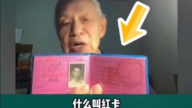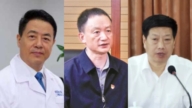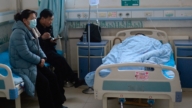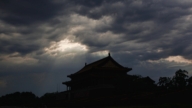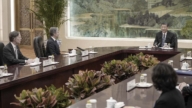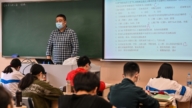【新唐人2012年11月22日讯】中共十八大之后的人事调整已经拉开序幕。政法委被降级,上海、重庆市委书记已经被调换。不过,外界认为,中共新一届人事大换班,都是在缺乏公开和不合法的程序下操作,大换班就是一场权力的再分配。大陆民众表示,现在当局打压民众一点都没有收减,所以,在中共体制内谁上谁下,民众已经不抱有任何希望,只等待像戈尔巴乔夫这样的人物出现。
中共在十八届代表大会上完成最高领导层换届之后,开始进行新的重要人事部署。中共官方喉舌《新华社》20号宣布,原吉林省委书记孙政才,接替张德江,出任重庆市委书记;上海市市长韩正兼任上海市委书记。
另外,中共国务委员、现任公安部部长孟建柱兼任政法委书记,取代已经卸任的周永康;而中共中央组织部部长李源潮的职务,将由在十八大上当选为中央书记处书记的赵乐际担任。
针对中共十八大之后的这样一个人事部署,大陆民主人士恩广表示,中共从毛泽东开始就开始所谓的政治协商,没有真正的民主议程。只是逐步的遗留,以这种方式一直走到今天。
大陆民主人士恩广:“一个人也可以改变一个制度,一个制度也可以改变一个人,它们都是相互左右的。关键的问题是,最高决策他的胸怀有多大?又一个权力中心!他到了他能维护这个权力中心的时候,他能不能再…就像走蒋经国的路呢?”
恩广指出,现在中国社会矛盾的激化,经济逐步的衰败,以及大规模土地收益已经到了极限,这种情况下,当局如果在行政支出方面还是大量增加,或不断的增加税赋,以及包括社保等不兑现的话,民众肯定会抗争。
而《纽约时报》报导说,如今,中国比任何时候都更需要优秀的领导人,来应对严峻的经济、社会和政治问题。不过,大陆维权人士曹庆岩表示,上来的这一批人,老百姓都感到非常失望。
大陆维权人士曹庆岩:“老百姓本身都是些好人,只要是一加入共产党了,他就坏了。这就出现什么呢?就是它本身的体制败坏了。所以谁上来,只要是共产党,老百姓都没希望。中国如果真正的对老百姓好,就是共产党不能存在,老百姓才能好。”
曹庆岩指出,虽然现在常委席次中拔掉了政法委,但是全国各地打压老百姓的趋势,只有上升,没有改变。
曹庆岩:“经过我们了解,我们山东的有些地盘,只要上访的,全部给控制在家了,就是不该给拘留的给拘留了,不该关的也都给关起来了,所以我们老百姓一看到共产党,不管是谁上来干,谁上台?共产党不彻底的改朝换代,这个共产党在中国来说就是一个祸害。”
卸任前的周永康,曾兼任“中央政法委和综治委”两个机构的主任职务,管辖的部门包括中国公安、国安、检察、法院、监狱等。这期间,社会维稳经费预算高达每年7000亿元,超过官方公布的军费支出。而且,在维稳的名义下,扩大警察系统权力,镇压政治异议人士和各界民众,致使近年来中国社会群众事件显着增加。据统计,去年(2011年)中国大约发生18万起民众抗议事件。
大陆人士蒋先生:“本来公、检、法应该像三国时魏、蜀、吴一样,相互制约的。结果,它来个刘、关、张,桃源三结义!一家的吗?司法独立?司法不独立,你说,不成个鬼笑话吗?”
这位大陆人士蒋先生还指出,现在由于媒体和网路信息的传递,中国老百姓也不是那么好糊弄了,都在觉醒。因此他表示,习近平能否成为中国的戈尔巴乔夫,百姓都在拭目以待。
采访编辑/唐睿 后制/黎安安
China’s Mikhail Gorbachev Now Expected
Personnel appointment has kicked off in China after
the end of the 18th Chinese Communist Party Congress.
The role of CCP Central Political-Legal Commission (CPLC)
has been downgraded.
Shanghai and Chongqing have seen party chief reshuffles.
Commentators view the new round of personnel shifts as
lacking public scrutiny and legal procedure.
In other words, this is another round of power redistribution.
A mainlander reveals that the CCP crackdown has not yet abated.
And citizens no longer hold out any hope for CCP rule
they now only hope for a Chinese Mikhail Gorbachev.
After its top power handover, the CCP regime has started
other key leadership appointments.
On Nov. 20, CCP mouthpiece Xinhua News Agency declared
that Sun Zhengcai takes over as Chongqing Party chief,
Han Zheng, Shanghai mayor,
doubles as the city’s Party chief.
The current CCP police chief Meng Jianzhu replaces
Zhou Yongkang as new head of CCP Central Political-Legal Commission (CPLC).
Zhao Leji, CCP Central Committee secretariat, concurrently
serves as head of the Central Organization Department.
En Guang, a democrat in China,
comments on these new personnel assignments.
He says, the CCP regime’s political consultation system
has never gone through a real democratic process.
The practice started from the era of Mao Zedong’s rule,
and remains today.
En Guang: “A person can change a system,
and vice versa. Both can influence each other.
Now the problem is, the top ruler is nothing but a power
center. Will he employ his power in a way like Chiang Ching-kuo?"
En Guang says that social conflicts have peaked in China.
With economic slowdown and massive land sales,
civilians’ survival problems have been stretched to the limit.
If the authorities continue to expand administrative
spending, increase levy size, and
to default social welfare payments,
China will see a surge of mass protests, he thinks.
A commentary published on the New York Times said,
“the most capable leaders ever are needed now to tackle
China’s daunting economic, social, and political problems."
Cao Qingyan, rights activist in China, says that citizens
feel disappointed with the new CCP leadership team.
Cao Qingyan: “Ordinary people, once joining the CCP,
will turn sour. That’s because the system is bad in itself.
So whoever within the CCP will come into power
can offer no hope for it’s citizens.
True fortune will only fall on the Chinese people
when the CCP perishes."
Cao Qingyan reveals that the regime’s crackdown now
continues to grow across China,
even though the role of the CPLC has been ousted from
the CCP top ruling circle.
Cao Qingyan: “So far as we know, petitioners in some places
in Shandong have all been put under house arrest.
So for our civilians, as long as the CCP still rules China
There will be no radical change, it’s a disaster for the whole country."
Before leaving office, Zhou Yongkang concurrently served
as the head of both the CPLC and of internal security.
Under his jurisdiction are the organs of public security,
national security, procuratorate, courts, and prisons.
During Zhou’s tenure, the budget on stability maintenance
reached 700 billion RMB yearly, exceeding military spending.
In the name of stability preservation, Zhou Yongkang
expanded police power to repress dissidents and the populace.
This resulted in an upsurge of mass protests in China.
Public data show that in 2011,
some 180,000 mass protests took place in China.
Mr. Jiang (Citizen in China): “Checks and balances should
have existed among systems of public security, procuratorate and courts.
But now they have turned into three allies!
So how can we expect judicial independence in China?"
Mr. Jiang remarks that information exchange through media
and the internet have helped awaken Chinese citizens.
He says that now the Chinese people are all waiting to see
whether Xi Jinpin will become China’s Mikhail Gorbachev.


